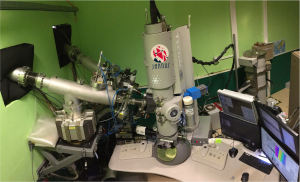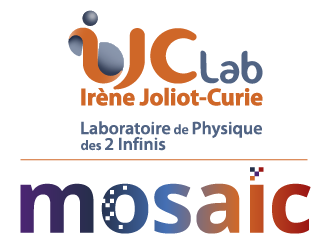
MOSAIC is an interdisciplinary research ion beam platform supporting many scientific disciplines: materials science, astrochemistry, astrophysics, nuclear physics, geology, biology, environment, etc. Applications cover fields as varied as: nuclear (fusion/fission) and solar energies, micro- and nano-electronics, production of isotopes for the medical sector, accelerators, detectors, biology, etc.
The platform consists of various equipment for irradiation/implantation/synthesis (ARAMIS accelerator, Andromede accelerator, IRMA implanter, SIDONIE isotope separator, Tancrede) and for structural and chemical analysis (RBS, ERDA, PIXE, PIGE, MSI, and TEM, SEM, AFM). The experimental hall bringing together the IRMA implanter, the ARAMIS accelerator, and the various associated beam lines is known as JANNuS-Orsay.
The coupling of the Transmission Electron Microscope (in situ TEM) with ARAMIS and IRMA is unique in the world due to the diversity of elements and energies that it allows to accelerate inside the microscope. This device makes it possible to characterize in situ at the nanometric scale the evolution of structural and chemical modifications of materials subjected to one or two ion beams.
Mass spectrometry imaging (MSI) makes it possible to study different types of samples in a wide variety of fields, in materials science, astrochemistry (chemical molecular characterization), in biology (search for molecules of interest in different mineral matrices and organic). The use of high-energy nanoparticles as projectiles to probe surfaces is nationally and internationally unique.
The MOSAIC platform, and in particular the JANNuS-Orsay experimental hall, has been linked since 2005 to the CEA’s JANNuS-Saclay platform, via the JANNuS Scientific Interest Group (GIS). These two platforms are founding members of the EMIR&A federation of accelerators, which is included in the national roadmap for research infrastructures.
MOSAIC was born in 2023 from the combination of the Andromede and JANNuS-SCALP platforms of IJCLab.







